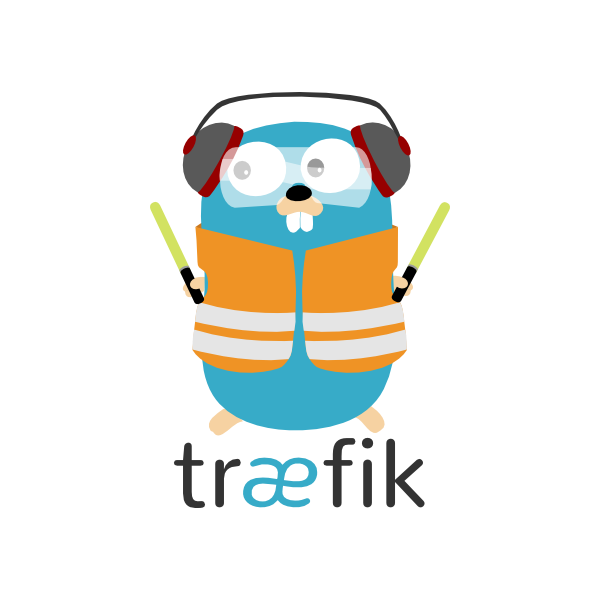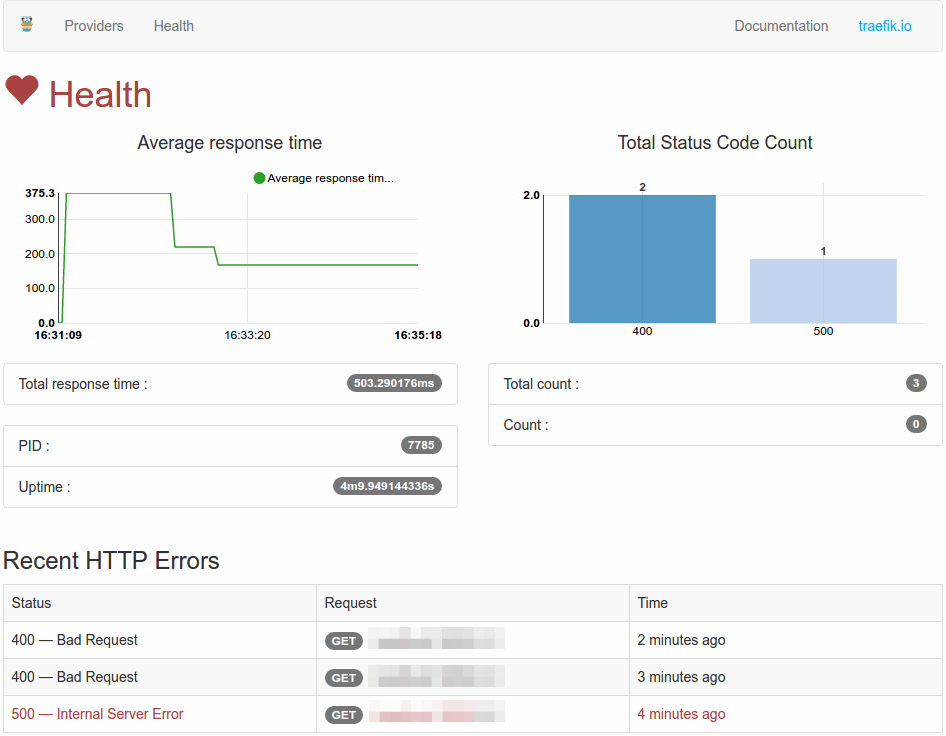
[](https://semaphoreci.com/containous/traefik)
[](https://docs.traefik.io)
[](http://goreportcard.com/report/containous/traefik)
[](https://microbadger.com/images/traefik)
[](https://github.com/containous/traefik/blob/master/LICENSE.md)
[](https://traefik.herokuapp.com)
[](https://twitter.com/intent/follow?screen_name=traefikproxy)
Træfik (pronounced like [traffic](https://speak-ipa.bearbin.net/speak.cgi?speak=%CB%88tr%C3%A6f%C9%AAk)) is a modern HTTP reverse proxy and load balancer made to deploy microservices with ease.
It supports several backends ([Docker](https://www.docker.com/), [Swarm](https://docs.docker.com/swarm), [Kubernetes](http://kubernetes.io), [Marathon](https://mesosphere.github.io/marathon/), [Mesos](https://github.com/apache/mesos), [Consul](https://www.consul.io/), [Etcd](https://coreos.com/etcd/), [Zookeeper](https://zookeeper.apache.org), [BoltDB](https://github.com/boltdb/bolt), [Eureka](https://github.com/Netflix/eureka), [Amazon DynamoDB](https://aws.amazon.com/dynamodb/), Rest API, file...) to manage its configuration automatically and dynamically.
---
| **[Overview](#overview)** |
**[Features](#features)** |
**[Quickstart](#quickstart)** |
**[Web UI](#web-ui)** |
**[Test it](#test-it)** |
**[Documentation](#documentation)** |
**[Support](#support)** |
**[Release cycle](#release-cycle)** |
| **[Contributing](#contributing)** |
**[Maintainers](#maintainers)** |
**[Plumbing](#plumbing)** |
**[Credits](#credits)** |
---
## Overview
Imagine that you have deployed a bunch of microservices on your infrastructure. You probably used a service registry (like etcd or consul) and/or an orchestrator (swarm, Mesos/Marathon) to manage all these services.
If you want your users to access some of your microservices from the Internet, you will have to use a reverse proxy and configure it using virtual hosts or prefix paths:
- domain `api.domain.com` will point the microservice `api` in your private network
- path `domain.com/web` will point the microservice `web` in your private network
- domain `backoffice.domain.com` will point the microservices `backoffice` in your private network, load-balancing between your multiple instances
But a microservices architecture is dynamic... Services are added, removed, killed or upgraded often, eventually several times a day.
Traditional reverse-proxies are not natively dynamic. You can't change their configuration and hot-reload easily.
Here enters Træfik.

Træfik can listen to your service registry/orchestrator API, and knows each time a microservice is added, removed, killed or upgraded, and can generate its configuration automatically.
Routes to your services will be created instantly.
Run it and forget it!
## Features
- [It's fast](http://docs.traefik.io/benchmarks)
- No dependency hell, single binary made with go
- Rest API
- Multiple backends supported: Docker, Swarm, Kubernetes, Marathon, Mesos, Consul, Etcd, and more to come
- Watchers for backends, can listen for changes in backends to apply a new configuration automatically
- Hot-reloading of configuration. No need to restart the process
- Graceful shutdown http connections
- Circuit breakers on backends
- Round Robin, rebalancer load-balancers
- Rest Metrics
- [Tiny](https://microbadger.com/images/traefik) [official](https://hub.docker.com/r/_/traefik/) docker image included
- SSL backends support
- SSL frontend support (with SNI)
- Clean AngularJS Web UI
- Websocket support
- HTTP/2 support
- Retry request if network error
- [Let's Encrypt](https://letsencrypt.org) support (Automatic HTTPS with renewal)
- High Availability with cluster mode
## Quickstart
You can have a quick look at Træfik in this [Katacoda tutorial](https://www.katacoda.com/courses/traefik/deploy-load-balancer) that shows how to load balance requests between multiple Docker containers. If you are looking for a more comprehensive and real use-case example, you can also check [Play-With-Docker](http://training.play-with-docker.com/traefik-load-balancing/) to see how to load balance between multiple nodes.
Here is a talk given by [Emile Vauge](https://github.com/emilevauge) at [GopherCon 2017](https://gophercon.com/).
You will learn Træfik basics in less than 10 minutes.
[](http://www.youtube.com/watch?v=RgudiksfL-k)
Here is a talk given by [Ed Robinson](https://github.com/errm) at [ContainerCamp UK](https://container.camp) conference.
You will learn fundamental Træfik features and see some demos with Kubernetes.
[](https://www.youtube.com/watch?v=aFtpIShV60I)
## Web UI
You can access the simple HTML frontend of Træfik.


## Test it
- The simple way: grab the latest binary from the [releases](https://github.com/containous/traefik/releases) page and just run it with the [sample configuration file](https://raw.githubusercontent.com/containous/traefik/master/traefik.sample.toml):
```shell
./traefik --configFile=traefik.toml
```
- Use the tiny Docker image and just run it with the [sample configuration file](https://raw.githubusercontent.com/containous/traefik/master/traefik.sample.toml):
```shell
docker run -d -p 8080:8080 -p 80:80 -v $PWD/traefik.toml:/etc/traefik/traefik.toml traefik
```
- From sources:
```shell
git clone https://github.com/containous/traefik
```
## Documentation
You can find the complete documentation [here](https://docs.traefik.io).
## Support
To get basic support, you can:
- join the Traefik community Slack channel: [](https://traefik.herokuapp.com)
- use [Stack Overflow](https://stackoverflow.com/questions/tagged/traefik) (using the `traefik` tag)
If you prefer commercial support, please contact [containo.us](https://containo.us) by mail: .
## Release cycle
- Release: We try to release a new version every 2 months
- i.e.: 1.3.0, 1.4.0, 1.5.0
- Release candidate: we do RC (1.**x**.0-rc**y**) before the final release (1.**x**.0)
- i.e.: 1.1.0-rc1 -> 1.1.0-rc2 -> 1.1.0-rc3 -> 1.1.0-rc4 -> 1.1.0
- Bug-fixes: For each version we release bug fixes
- i.e.: 1.1.1, 1.1.2, 1.1.3
- those versions contain only bug-fixes
- no additional features are delivered in those versions
- Each version is supported until the next one is released
- i.e.: 1.1.x will be supported until 1.2.0 is out
- We use [Semantic Versioning](http://semver.org/)
## Contributing
Please refer to [contributing documentation](CONTRIBUTING.md).
### Code of Conduct
Please note that this project is released with a [Contributor Code of Conduct](CODE_OF_CONDUCT.md).
By participating in this project you agree to abide by its terms.
## Maintainers
[Information about process and maintainers](MAINTAINER.md)
## Plumbing
- [Oxy](https://github.com/vulcand/oxy): an awesome proxy library made by Mailgun folks
- [Gorilla mux](https://github.com/gorilla/mux): famous request router
- [Negroni](https://github.com/urfave/negroni): web middlewares made simple
- [Lego](https://github.com/xenolf/lego): the best [Let's Encrypt](https://letsencrypt.org) library in go
## Credits
Kudos to [Peka](http://peka.byethost11.com/photoblog/) for his awesome work on the logo .
Traefik's logo licensed under the Creative Commons 3.0 Attributions license.
Traefik's logo was inspired by the gopher stickers made by Takuya Ueda (https://twitter.com/tenntenn).
The original Go gopher was designed by Renee French (http://reneefrench.blogspot.com/).

